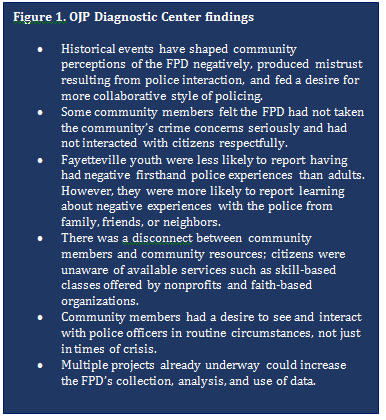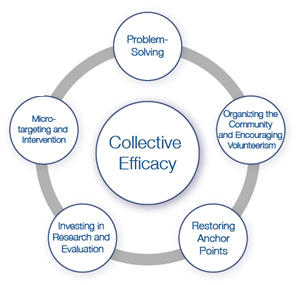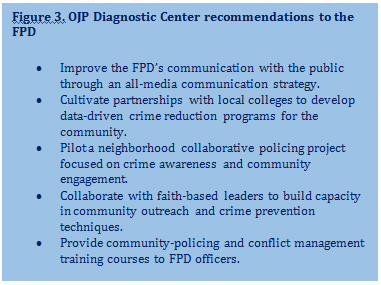How Does the Federal Government Help Communities Leverage Data-Driven Change to Improve Public Safety?
U.S. Department of Justice, Office of Justice Programs Diagnostic Center
You read about the Office of Justice Programs Diagnostic Center in the August edition of Community Policing Dispatch. Learn more about how our office helps communities use data to improve public safetyóand how we helped Fayetteville, North Carolina, in particular.
Law enforcement agencies face complex challenges in todayís environment. From the need to address persistent and emerging crime problems to pressures to facilitate cooperative community relationships, where can an agency turn for support?
"The Diagnostic Center gave officers, residents, and stakeholders a voice in the process. . . . We as a community are once again investing in one another, and our social ties are rebuilding our common goal of a safe community. "
-Fayetteville Police Chief Harold E. Medlock
Our office, the U.S. Department of Justice (DOJ) Office of Justice Programs (OJP) Diagnostic Center, works in collaboration with local agencies to tackle public safety challenges. As a federal technical assistance resource, we work with community stakeholders to use local data to define what drives specific public safety challenges and determine what will work in specific communities. Our diagnostic specialists use their subject matter expertise to craft workable solutions ranging from peer-to-peer exchanges to a host of training offerings and to provide support for the development of comprehensive, cross-system community safety strategies. Best of all, our assistance comes at no cost to communities and enables local agencies to leverage technical assistance resources available across the DOJ.
The Fayetteville (North Carolina) Police Department (FPD) sought such assistance from our office in March 2014. Having experienced issues with violent crime and community-police relations, the FPD sought our assistance in three areas: (1) identifying factors that contribute to the increase in violent crime among youth and young adults, (2) evaluating internal policies and practices on community-police interactions, and (3) improving community-police relations.
To address the FPDís request effectively, we coordinated our response with the DOJ Office of Community Oriented Policing Services (COPS Office). While the COPS Office focused on evaluating internal policies and practices relating to community-police interactions, we concentrated on evaluating data to develop strategies to address violent crime and improve community-police relations. Together, we offered the FPD a customized response.
In the four months following the FPDís request, we conducted site visits, analyzed crime data, and interviewed both community stakeholders and FPD representatives. Through this process, we evaluated FPD and community activities within a collective efficacy model (see figure 2 below). In this evaluation, we discovered crime drivers and community challenges (detailed in figure 2 below).
Based on these findings, we mapped recommendations aligned with the pillars of collective efficacy: (1) promote strategies to organize the community and encourage volunteerism, (2) restore community anchor points (e.g. schools, churches), and (3) invest in research and evaluation. (See the OJP Diagnostic Center full list of recommendations in figure 3.) |
 |
Figure 2. The collective efficacy model  |
|
As a result, the department decided to focus on three of the OJP Diagnostic Centerís recommendations (a comprehensive list of recommendations is captured in figure 3): First, the FPD is developing a comprehensive communication strategy to promote the departmentís missions. They are doing this by publicizing strategic, measurable, attainable, relevant and timely (SMART) goals. Creating consistent messaging, improving communication metrics, and effectively using multiple platforms will address the need to inform the community of events and resources while encouraging volunteerism. |
 |
Second, the FPD is developing a practice-based partnership with a university. Working with representatives from Curry College Master of Criminal Justice Program Research Collaboration and the Boston Police Department, through this partnership the FPD will leverage local academic expertise to assist with assessing and evaluating social capital within select communities.
Last, the FPD is implementing model practices in collaborative policing. By visiting the Las Vegas (Nevada) Metropolitan Police Departmentís neighborhood collaborative in the Sherman Gardens community, FPD representatives learned neighborhood collaborative policing practices that they will be employing to improve crime awareness and community engagement.
The Diagnostic Center continues to provide ongoing technical assistance to the FPD with the collaboration of our partners, leveraging federal resources to maximize outcomes within the community. We will work with the community to identify and collect identifying metrics for assessing outcomes.
As the FPD implements neighborhood collaboration projects, agency officials seek to use data more effectively, issue periodic assessments of their work and engage with their community members. In addition, the FPD has included community members in police processes, such as promotional panels, to enhance transparency.
Working with our office has given the FPD a fresh perspective on opportunities and empowered them to improve their interactions with the Fayetteville community in unprecedented ways. How can your agency use the collective efficacy model to assess your community relations? Reach out to the OJP Diagnostic Center team to find out more today.
Interested in learning more about how the OJP Diagnostic Center makes a lasting impact in the communities it serves? Visit the OJP Diagnostic Center website and follow them on social media to read about our engagements in a variety of communities nationwide.
September Photo Contest Winner | Stepping Up to Reduce Mental Illness | Leveraging Data-Driven Change
